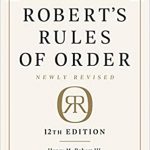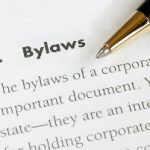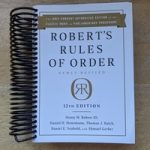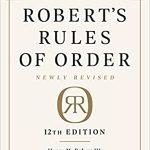Robert’s Rules of Order
Updated July 14, 2021 The different rules for small boards are one of the best-kept secrets of Robert’s Rules of Order. If you serve on a small board (up to about 12 people) you may benefit from the flexibility that the rules for small boards offer. Robert’s Rules of Order Newly Revised, 12th edition says…
Have you ever wondered whether a fill in the blank approach could be useful to your board or council? Sometimes a board of directors has to make hard choices about selling property, giving the executive director a raise, making an appointment or choosing a date to schedule an event. Robert’s Rules of Order offers an…
A reader contacted us to find out how to tackle a number of changes needed for his bylaws. He was uncertain as to how to go about it and felt intimidated by the task. While it’s true that almost everyone hates bylaws (attorneys and parliamentarians are the exception), it is possible to change them without…
Have you ever been at a meeting where the person who made a motion becomes unhappy about the direction of the discussion, and says, “OK, I withdraw my motion”?
Updated July 22, 2021 The “motion to appeal” is one of the least-known motions in Robert’s Rules of Order, and the most powerful. All of us are very familiar with the role of the chair of the meeting. Under Robert’s Rules of Order, the chair has the duty of keeping things on track. The chair…
The motion “to call the question,” which has the technical name of “previous question,” may be the most abused motion in all of Robert’s Rules of Order. It is very common for people to shout out the word “question” or “I call the question” in the expectation that debate will immediately stop, and a vote…
Updated July 14, 2021 Special rules of order are permanent rules, specific to your group, that guide your discussions and meetings. They allow you to make sure that your group talks about things and makes decisions in the way that works best for you. Robert’s Rules of Order encourages groups to set up their own special…
People are sometimes confused about precedence of motions in Robert’s Rules of Order. In essence it is rather simple. The principle is that each motion has a number or rank. When motions are pending, motions with a higher rank may be made, but motions with a lower rank are out of order (not allowed). The…
What is a “friendly amendment” in Robert’s Rules of Order and parliamentary procedure? This term is frequently misused. Here is our explanation: (1) An amendment is a proposal to change a motion – a proposed action – being considered by a group. (2) Sometimes people suggest amendments with the intention of making the original motion…
The 12 edition of Robert’s Rules has just been published. More information coming soon.









